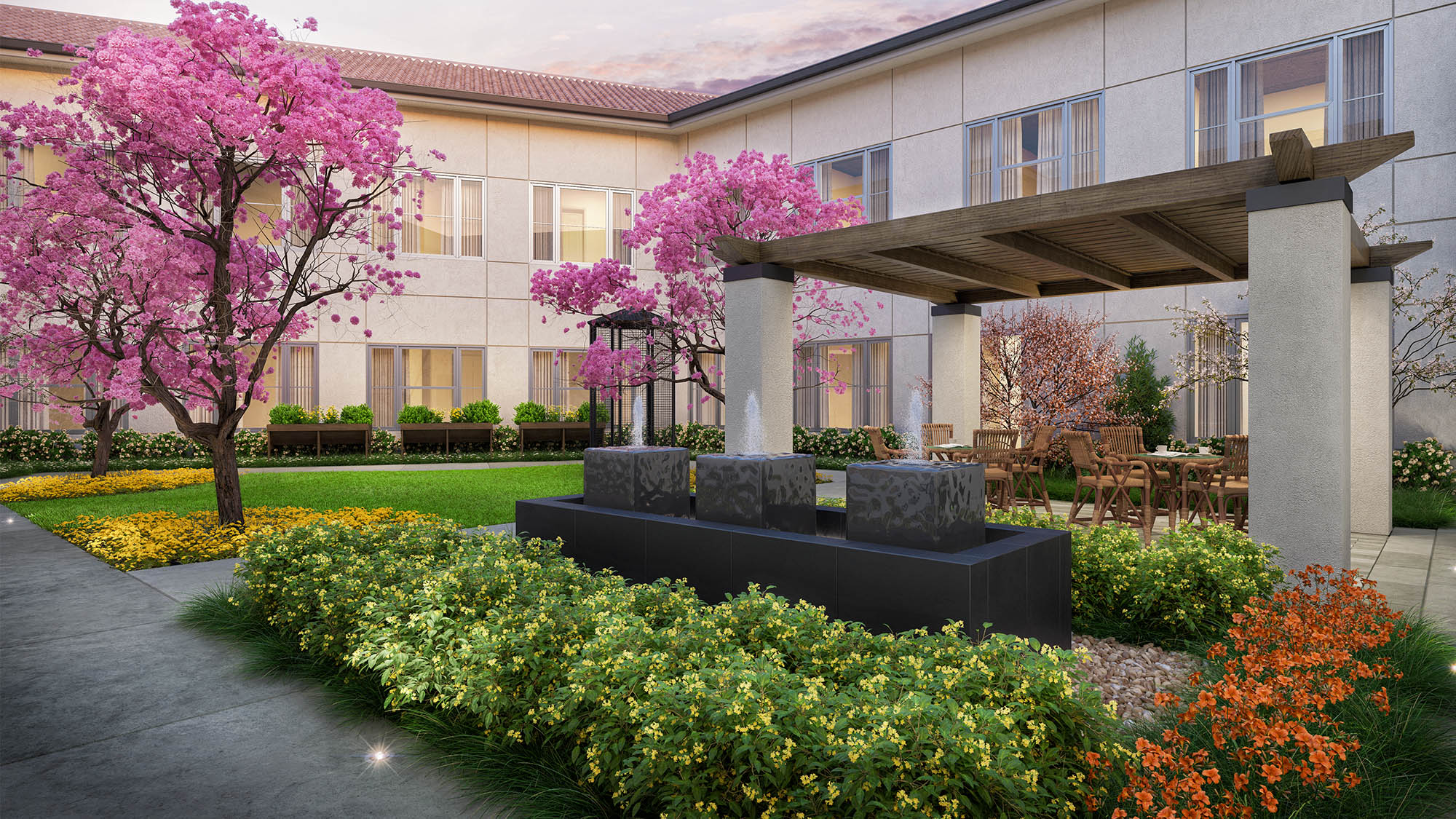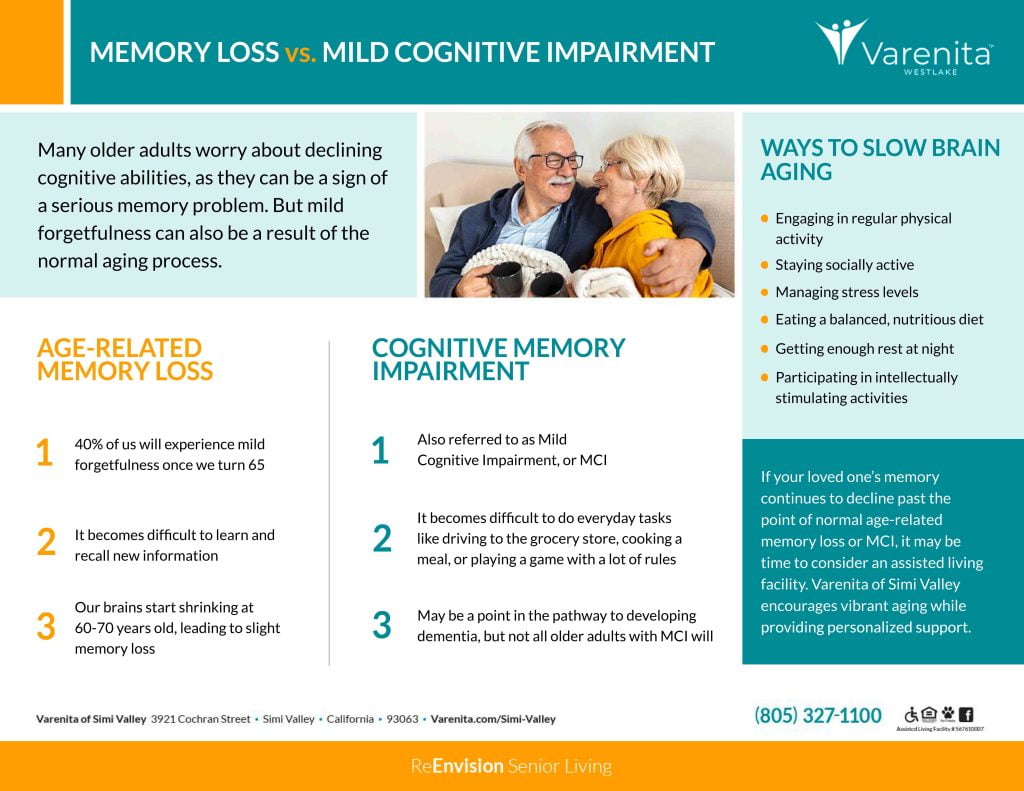Memory Care
Knowing the Difference Between Age-Related Memory Loss and Cognitive Memory Impairment

Many older adults worry about declining memory and cognitive abilities, as they can be a sign of a serious memory problem and the need for assisted living in Simi Valley. But this isn’t always the case. Mild forgetfulness can also be a result of the normal aging process.
If you’ve been having a hard time remembering information, see your general healthcare physician for a thorough evaluation. In the meantime, here are some ways to tell the difference between age-related memory loss and true cognitive memory impairment.
Please note that this article is not meant as a diagnostic tool and is not a substitute for medical advice. If you are concerned about yourself or a loved one who is showing signs of memory impairment, contact your doctor.
What is Normal Forgetfulness and What is Not?
Basic forgetfulness is usually not something to worry about. In fact, it happens to about 40% of us once we turn 65. This memory loss is typically related to normal changes happening in the brain, though it could be a side effect of one of your medications.
Generally speaking, age-related changes in the brain make it harder to learn and recall new information. However, performing tasks, remembering events from years ago and general knowledge tend to be preserved. While frustrating at times, normal forgetfulness will not stop you from living your life.
On the other hand, serious cognitive problems make it difficult to do everyday tasks like driving to the grocery store, cooking a meal or playing a game with a lot of rules. Cognitive conditions are also progressive and will gradually worsen until you require memory care in Simi Valley. This may feel scary, but it also allows you to plan accordingly for the future.
Why Does Memory Change with Aging?
Aging is a natural process that happens to everyone. As we age, the brain changes more than any other part of the body! During the first few years of life, the brain forms more than 1 million new neural connections every second. By age 6, the brain is 90% of its adult size. However, some of the last areas to mature don’t happen until 35 years of age.
By the time you’re 60-70 years old, your brain starts shrinking. Some of the changes that take place are:
- Cortical density. This refers to the thinning of the outer surface of the brain. With decreasing synaptic connections, you may experience slower cognitive processing.
- White matter. Researchers believe that myelin (insulating layer around the nerves) shrinks with age, causing slower cognitive functions.
- Neurotransmitter systems. The brain generates fewer chemical messengers with age, which decreases dopamine, serotonin and other chemicals. This could play a role in declining memory and increasing depression.
Will My Memory Continue to Worsen with Age?
Even though the brain changes significantly, not everyone will experience problems with their memory. Many people are able to retain the knowledge and skills learned throughout their lives. About 40% will experience some form of memory loss after turning 65.
Researchers also believe that mild cognitive impairment (MCI), which is not part of the normal aging process, may be a point in the pathway to developing dementia. Not all older adults with MCI will develop dementia but some will. Severe cognitive problems are progressive and eventually require dementia care in Simi Valley.
What are the Different Levels of Memory Loss?
Dementia is not something you wake up with one morning. There are different levels of memory loss. By understanding these levels, you can recognize MCI and plan for future assisted living in Simi Valley, CA.
- Age-related memory loss. You may have difficulty remembering things on occasion, such as where you left your car keys or the name of an old neighbor. These changes usually begin in your late 60s or early 70s.
- Mild cognitive impairment. MCI refers to the time in between age-related memory loss and dementia. The symptoms are mild, but they also indicate an increased risk for Alzheimer’s or other cognitive diseases.
- Dementia refers to a set of symptoms that make it difficult to complete everyday activities. You may find it hard to learn new information or follow your normal routine.
Is There a Way to Slow Brain Aging?
By leading an active, productive lifestyle, you can keep your brain sharp and slow the progression of cognitive decline. The best part is, you don’t have to wait to implement these strategies. You can start living your best life now at a luxury senior living facility in Simi Valley.
Some of the best ways to slow brain aging are:
- Engaging in regular physical activity
- Staying socially active
- Managing stress levels
- Eating a balanced, nutritious diet
- Getting enough rest at night
- Participating in intellectually stimulating activities

Luxury Memory Care in Simi Valley
Varenita by Griffin Living offers luxury senior living in Simi Valley, CA. Our vibrant retirement community encourages residents to lead active, enriching lives while receiving personalized support and attention. To learn more about living beautifully and independently in older age, contact Varenita of Simi Valley today.